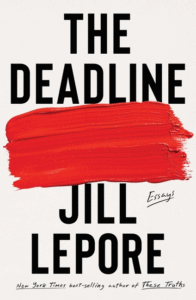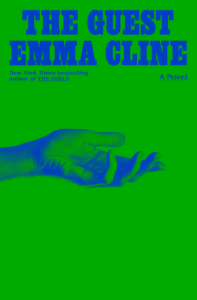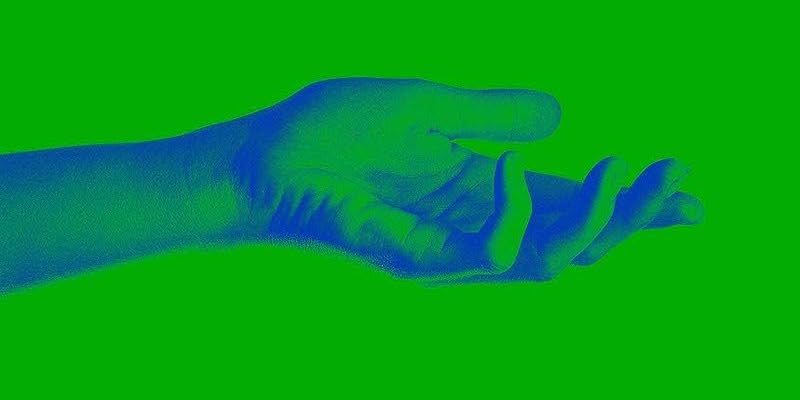
5 Book Reviews You Need to Read This Week
"Dickens may be dead, but Smith, thankfully, is alive."
Our smorgasbord of superior reviews this week includes Karan Mahajan on Zadie Smith’s The Fraud, Christian Lorentzen on Don DeLillo’s Three Novels of the 1980s, Sloane Crosley on Jill Lepore’s The Deadline, Jane Hu on Emma Cline’s The Guest, and Mayukh Sen on Yunte Huang’s Daughter of the Dragon.
Brought to you by Book Marks, Lit Hub’s “Rotten Tomatoes for books.”
*
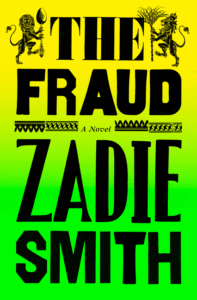
“It offers a vast, acute panoply of London and the English countryside, and successfully locates the social controversies of an era in a handful of characters … The echoes of mindless Trumpism are clear, and it is evidently why Smith was drawn to this trial, which was a cause célèbre in England at the time and was a bottomless well of populist nuttiness…What better way to write about Trump and Trumpism than to avoid flattering Trump with another Trump portrait? But. This is a novel, and the novelist’s intelligence is drawn in idiosyncratic directions … Touchet is the most morally intelligent character Smith has written … The book’s structure is uneven. One wishes, for instance, that the chapters would signal their time jumps more consistently … But these infelicities stop mattering when we are deep into the trial and the book turns into a portrait of people with thwarted ambitions, of people who, like Ainsworth, become frauds without knowing … As always, it is a pleasure to be in Zadie Smith’s mind, which, as time goes on, is becoming contiguous with London itself. Dickens may be dead, but Smith, thankfully, is alive.”
–Karan Mahajan on Zadie Smith’s The Fraud (The New York Times Book Review)
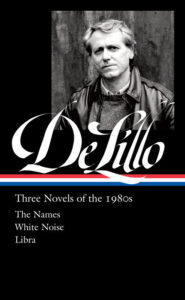
“Long hailed as a prophet, of the age of terrorism, of nuclear dread, of random peacetime violence, of the power of crowds, of the corrosive effects of mass media and consumerism, of the ghostly warping powers of intelligence services, he is now seeing his work being set in amber, surely anticipating the involuntary mutations that await the posthumous. In the end, somebody once said, all plots lead deathward … John Ashbery’s 1972 poem ‘The System’ begins with the sentence ‘The system was breaking down,’ but the remarkable thing about the system is that it hasn’t broken down; that it is always breaking down, but always somehow reinforcing itself; that even an event like the collapse of the Soviet Union didn’t lead to another cataclysm (though the specter of nuclear Armageddon remains) but to an increasingly intertwined world troubled by outbreaks of violence in borderlands and interzones, such as the ongoing bloodletting in Ukraine. The resulting landscape has been saturated with universally available information and thus, from the point of view of, say, a protagonist of a novel, holistically unknowable. This paradox—the overflow of information combined with its fundamental incomprehensibility—became for a certain kind of writer the central problem for the novel to attempt to grasp … The sort of novel I’m talking about, often thought of and taught in schools as the quintessential postmodernist novel, also goes by another name: the systems novel … James Axton, Jack Gladney, Lee Harvey Oswald, Bill Gray, Nick Shay. Blunt, stunted men not entirely aware of the circumstances that govern their lives. Husbands and lovers in familial, romantic, sexual disarray. Men buffeted by tides of history they can only strive to comprehend. These are DeLillo’s ‘systems men’ … These men move through the books not fully aware of the forces operating on them, unable to comprehend the whole picture, moving by instinct and hunch, and knowing any sense of control is an illusion. They sense that they are not in the subject position. It belongs to the system itself. As Oswald put it, ‘I’m a patsy.’”
–Christian Lorentzen on Don DeLillo’s Three Novels of the 1980s: The Names/White Noise/Libra (Bookforum)
“In 1636, at the height of the Dutch economic hysteria known as Tulipomania, John Harvard helped found the first college of the American colonies. I like to trot out this fact at parties because of its skewed implication that meanwhile, on this side of the ocean, the 17th century had its head screwed on straight. It’s a good thing I do not have Jill Lepore’s job. A professor of history at John Harvard’s start-up as well as staff writer for The New Yorker, she is the finest practitioner of historical extrapolation working today; there is no one better at excavating the underlying ideologies at the root of our contemporary problems and holding them up to the light … Both shorter and less focused in scope than her 2020 book of American history, These Truths. But with 46 essays on subjects ranging from political theory to disruptive innovation, it’s still a doorstop … Lepore’s wealth of knowledge is rarely applied to a niche subject (most readers are familiar with the Affordable Care Act); her modus operandi is to tackle common conundrums for a few unassuming paragraphs before stepping on the gas with several centuries’ worth of precedent … It’s her inclinations toward misfits and old narratives we have taken for granted that make The Deadline glow … They’ve sent a personal essayist to review an academic essayist’s work, so I can’t help but remark upon the moments when Lepore makes an effort to weave in her personal stories and winds up sounding like a tourist over-pronouncing the word croissant … One can still taste the sediment of that self-consciousness at the bottom of each glass. Regardless, the book emerges as a riveting survey of America.”
–Sloane Crosley on Jill Lepore’s The Deadline: Essays (The New York Times Book Review)
“The objectification of women is a central theme in Cline’s fiction, though perhaps never so overtly as in The Guest, where it manifests through the naked commodification of its heroine … if Cline’s fiction about aging men affords them a perverse excess of interiority, then her portrayal of young women risks doing, if anything, the opposite. The heroine of The Guest might be described as leaning into her own objectification—claiming it, however uneasily, as a form of empowerment … As Alex starts losing her grip, readers might expect her to turn to backstory, dredging up biographical details that could explain her deviant, often self-destructive, behavior. But Cline’s narration lingers stubbornly, stickily, on the surface. As the author notes in interviews, her aim was to avoid what she calls ‘trauma math,’ in which some primal wound would illuminate her character’s actions. Rather than have Alex look inward, Cline draws her out through other means—by, you might say, looking outward. Alex gradually comes into focus not through what she says about herself, but what she imagines other people see when they look at her. Cline writes Alex out of ‘negative space’—manifesting her contours through how she interfaces with the world, what she notices in it. This kind of aggressively spectral heroine—thin in more ways than one—seems increasingly a mainstay of contemporary Anglophone fiction. As with Rachel Cusk’s recent protagonists, they’re known more through their characterological outlines than their interior motivations. Or like Sally Rooney’s brittle heroines, they work through their inner wounds by worrying their outer ones. Alex is forever picking away at her body—as if one way to confirm whether this body can feel is to test whether it bleeds when pricked … One could say that Alex possesses a relentless death drive, though The Guest—unlike Freud’s theory—offers no origin story for her impulsiveness. Like any good gothic plot, Cline’s novel rivets as it follows Alex into progressively fatal encounters. But the inverse is also true: as the hazards compound, readers struggle to grasp what exactly is psychologically motivating Alex, given the notable absence of sociological background. Instead, what Cline has created is a heroine who, in order to keep self-reflection at bay, must herself actively pursue self-annihilation.”
–Jane Hu on Emma Cline’s The Guest (Bookforum)
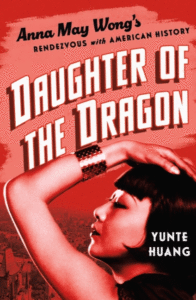
“Though Huang sets Wong’s rising career against the backdrop of pervasive anti-Asian sentiment in America, he mostly avoids simplifying her into an easy icon of empowerment or an object of pity. Nor does he judge her for the concessions that she made in her choice of roles. Many Asian Americans at the time chided Wong for perpetuating stereotypes. Huang intelligently draws a parallel to similar criticisms levelled against inheritors of Wong’s legacy—such as Michelle Yeoh and the Asian American actresses Nancy Kwan and Lucy Liu—to show the enduring tension between a community clamoring to be seen and the artists like Wong who have to shoulder the burdens of representation … Huang seems so concerned with meticulously building the world around Wong that his picture of Wong herself starts to dim. As a consequence, Wong feels sometimes less like a flesh-and-blood figure and more like a prop through which Huang conducts his survey of Asian American history. Huang does right by his subject, accessing her emotional core, when documenting the great heartbreak of Wong’s career…The account of Wong’s lobbying for the role of O-lan, and her quest to retain her pride in the face of humiliating rejection, is one of the book’s strongest. It possesses what other passages sometimes lack: an involving sense of our subject’s fears, her hopes—her humanity, in a word.”
–Mayukh Sen on Yunte Huang’s Daughter of the Dragon: Anna May Wong’s Rendezvous with American History (The New Yorker)
Book Marks
Visit Book Marks, Lit Hub's home for book reviews, at https://bookmarks.reviews/ or on social media at @bookmarksreads.










